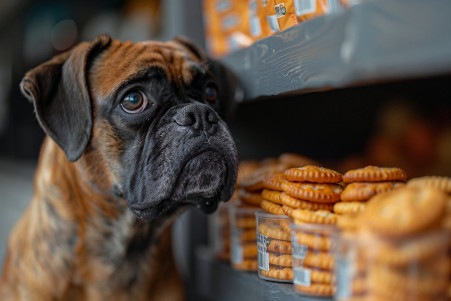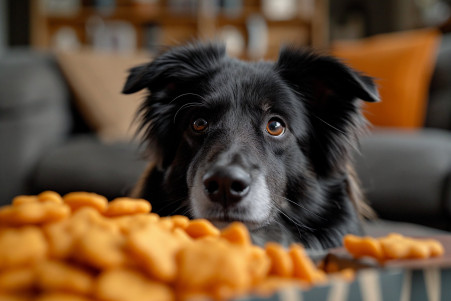Can Dogs Eat Saltine Crackers? What Pet Owners Should Know
6 March 2024 • Updated 6 March 2024

You may have a box of saltine crackers in your home, but can your dog enjoy them as a snack? Dogs should not eat saltine crackers on a regular basis because the high sodium levels can lead to digestive upset and salt poisoning. While an occasional plain cracker may not be harmful, it is best to steer clear of salty snacks and stick to healthier options that are specifically designed for dogs.
To help you better understand whether or not saltine crackers are safe for dogs, we will explore veterinary advice and nutritional research. We will consider the impact of sodium on dogs, outline the nutrients dogs need for a healthy diet, and discuss the wider implications of feeding human food to dogs.
This will give you a better understanding of how occasional human food snacks can impact your dog’s diet and well-being, enabling you to make better choices about what to feed your canine companion.
Can dogs eat saltine crackers?
Risks of Salt Poisoning in Dogs
While salt is an important electrolyte in a dog’s diet, it can also be dangerous. Salt poisoning, or hypernatremia, occurs when a dog ingests too much salt. This can lead to salt toxicosis, a potentially life-threatening condition. The high levels of sodium in the body can cause cells to lose water, leading to brain swelling and damage to the nervous system.
According to the American Kennel Club, symptoms of salt poisoning in dogs include vomiting, diarrhea, lethargy, seizures, and in severe cases, death. Smaller dogs are at a higher risk of salt poisoning due to their lower tolerance for sodium.
If you think your dog has ingested a large amount of salt, take them to the vet immediately. According to PetMD, treatment for salt toxicity will likely involve hospitalization, IV fluids, and close monitoring of the dog’s blood pressure, electrolyte levels, and other vital signs.
As a dog owner, it’s important to keep salty foods out of your pet’s reach and make sure they have access to fresh water, especially in the winter months or when they’re exercising.
It may take several days for a dog to recover from salt poisoning, and during this time, vets will need to carefully reintroduce water and electrolytes to the dog’s system.
The long-term effects of salt poisoning will depend on how severe the poisoning was and how quickly it was treated. By being aware of these risks and taking steps to prevent them, you can help keep your dog healthy and safe, focusing on a diet that provides the nutrition they need without the dangers of too much salt.
Knowing What Your Dog Needs in Their Diet
A nutritious diet for dogs is about more than just meat; it includes a range of nutrients that can help support a dog’s overall health. According to VCA Animal Hospitals, dogs need a diet that includes a balance of proteins, fats, and complex carbohydrates, which are more easily digestible when cooked.
Proteins help repair muscles and tissues, fats help provide energy and support cell structure, and carbohydrates help provide energy and support the digestive system.
Vitamins and minerals, as the Merck Veterinary Manual explains, are also important for everything from bone formation to the regulation of body systems. Water is another dietary essential that helps keep dogs hydrated and supports bodily functions.
A dog’s nutritional needs are also impacted by their life stage, size, and activity level. Puppies and active dogs need more calories and specific nutrients to support their growth and energy needs, while older dogs may need lower-calorie diets that include nutrients that help support their joints.
It’s also important for dog owners to know that treats should be given to dogs in moderation and not as a regular part of their diet. The Association of American Feed Control Officials recommends that treats should make up no more than 10% of a dog’s daily caloric intake to ensure that they get the nutrition they need.
For example, while saltine crackers aren’t toxic to dogs, they don’t provide the balanced nutrition that dogs need and they are high in sodium, which can be dangerous. Because they don’t provide the balanced nutrition that dogs need, it’s best to stick with high-quality, dog-specific treats to ensure that you’re making the healthiest choice for your pet.
Health Risks and Benefits of Crackers for Dogs
While crackers can be a fun and tasty treat for dogs, they also come with some health risks and minimal health benefits.
For example, Hepper explains that some of the ingredients in crackers, such as garlic and onion, are toxic to dogs and can lead to anemia by causing damage to their red blood cells.
In addition, many crackers contain artificial preservatives and other additives that have no nutritional value and can even cause allergic reactions. In general, high-calorie treats like crackers, especially those that are high in sugar and fat, can lead to obesity, which can cause a variety of health problems, including heart disease and joint issues.
In terms of healthier options, you may want to consider lower-fat, lower-calorie treats like unsalted crackers. However, these should still be given in moderation due to their lack of nutritional value. Doghousefmb suggests healthier options like fresh, natural foods, such as green beans, unseasoned meats, or homemade treats that don’t contain any harmful additives.
When introducing new treats to your dog, it’s important to do so gradually. A-Z Animals recommends starting with small amounts and monitoring your dog for any signs of an allergic reaction. By choosing treats carefully and being mindful of portion sizes, you can enjoy snack time with your dog without putting its health at risk.
People Food and Dog Health: Finding the Right Balance
While giving dogs people food like saltine crackers may not seem like a big deal, it often leads to imbalanced nutrition and the resulting health and behavioral problems. PetMD reports that dogs who aren’t given people food have better body condition scores and are less likely to eat something toxic.
In addition, people who feed their dogs table scraps are more likely to have trained their dogs to beg, a behavior that can be hard to reverse.
In terms of health, dogs who eat people food may become picky eaters, choosing the more flavorful people food over their regular meals. This can lead to a lack of proper nutrition and even stress and anxiety, as a study from Faunalytics found that diet plays a major role in a dog’s behavior.
Nutrition, including the right balance of nutrients, is important to cognitive function and emotional well-being, which affects the areas of the brain that control behavior.
Responsible dog owners are mindful of the kind and amount of people food they give their dogs. The American Kennel Club says that the key is to be mindful of portion control and to know which foods are safe. By sticking to a consistent dog diet and only giving people food occasionally, dog owners can help ensure their dog’s physical and mental health.
Final Thoughts: Saltine Crackers and Your Dog’s Diet
So, while the occasional plain saltine cracker may not be an immediate danger to your dog’s health, it’s best to avoid giving them to your pet as a regular treat because of their high sodium content and lack of nutritional value.
If your dog ingests too much salt, it can result in salt toxicosis and other health problems like hypernatremia, which will require immediate veterinary care. Remember that treats should only account for up to 10% of your dog’s daily caloric intake in a balanced diet.
We’ve also talked about the importance of ensuring that your dog’s diet meets their nutritional requirements, which include proteins, fats, carbohydrates, vitamins, minerals, and water—all of which are essential for maintaining your dog’s health and well-being. The dangers of feeding dogs human food like saltine crackers include the potential for toxicity from harmful ingredients and the potential to disrupt their regular eating patterns and behavior.
As a dog owner, it’s up to you to make sure that you’re providing your pet with a diet that’s safe and meets their nutritional needs. When it comes to treats, stick to dog-friendly treats or safe, healthy human foods. And always check with your vet before you make any major changes to your dog’s diet to make sure that you’re keeping them healthy and happy.


